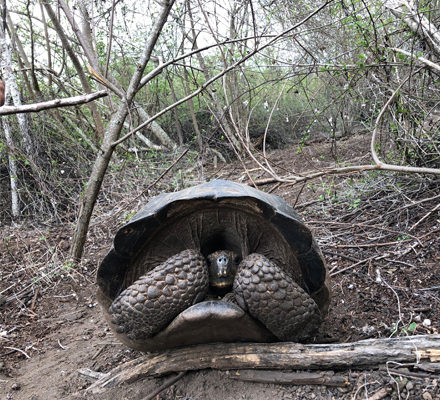Recent Headlines

Tortoise
ESF Professor Joins in Discovery of Thought-to-be-Extinct Tortoise
Turns out the Pinta Island tortoise, thought to be extinct with the passing of Lonesome George in 2012, is not totally lost.
Dr. James Gibbs, a professor at SUNY College of Environmental Science and Forestry (ESF), has spent the last month helping organize and execute an expedition that led to the identification of a young female with Pinta tortoise genes on Wolf Volcano, a large volcano on Isabela Island in the Galapagos. Working with ESF graduate and now project support specialist at the Galapagos Conservancy Harrison Goldspiel, along with a large team of park guards from the Galapagos National Park, Gibbs helped identify the 30-year-old tortoise from among approximately 8,000 other tortoises living on and native to the volcano.
"We had tagged her previously," said Gibbs, noting also that Pinta Island tortoises are known for having a shell shaped like a saddle, with a high front and shallow dip in the middle. "The discovery creates the opportunity to continue the species in some form. It's not a perfect form, but we've captured some of the Pinta Island tortoise's genome now, which will let us build a breeding program for repopulating tortoises on Pinta Island."
In total, the 45-member team found 31 tortoises believed to be partially descended from two formerly thought-to-be-extinct species: the Pinta Island tortoise (Lonesome George) and also the Floreana Island tortoise. Based on blood samples, the young female, who is known only by a string of numbers, is genetically 16 percent Pinta tortoise.
"Hundreds of years of human activity has taken its toll on the Galapagos tortoise population," said Gibbs. "Mostly people have killed tortoises for food. But some have also moved tortoises around the archipelago, which is likely how the trove of tortoises from other islands got established. Fortunately, with these hybrids now in captivity, we can start to recover two species of tortoises long given up as extinct."
Gibbs is a Distinguished Professor at ESF and also co-leads the Giant Tortoise Restoration Initiative (GTRI), a collaborative effort with the Galapagos Conservancy and the Galapagos National Park Directorate (GNPD), whose long-term goal of the initiative is to restore tortoise populations to their historical distribution and numbers across Galapagos, including on islands where tortoises went extinct.